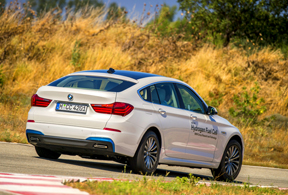BMW’s First Fuel-cell Car Now In Test Trials
 BMW AG will test a vehicle powered by hydrogen fuel cells on public roads this month as the German automaker looks to expand clean-car offerings after rolling out the battery-powered i3 in 2013.
BMW AG will test a vehicle powered by hydrogen fuel cells on public roads this month as the German automaker looks to expand clean-car offerings after rolling out the battery-powered i3 in 2013.
BMW is developing fuel cells with Japanese partner Toyota Motor Corp., and it demonstrated a 5-Series Gran Turismo prototype in June that uses the companies’ joint technology. The model is part of the car industry’s multibillion-dollar effort to create alternative powering setups and improve fuel use to meet tightening emissions rules.
Fuel cells, which have provided spacecraft with power since the 1960s, produce electricity by reacting hydrogen with air, enabling longer travel than battery-driven vehicles while emitting only water vapor rather than carbon dioxide. Disadvantages include a lack of service stations equipped to replenish the hydrogen gas, and the high cost of rare metals needed for the technology.
BMW also showed a plug-in hybrid version of its van-like 2-Series Active Tourer, due to go on sale next year, and a 1-Series compact equipped with a conventional motor that uses water injection to boost fuel efficiency.
By the start of 2018, the world’s fleet of fuel-cell cars will number just 8,400, up from a total 1,275 at the end of this year.
The fuel-cell Gran Turismo has a range of 310 miles before refueling. That’s more than triple the i3’s 160 kilometers. The i3’s batteries take at least five hours to recharge, compared with five minutes to fill the prototype’s hydrogen tank.
Toyota, the world’s biggest auto manufacturer, began sales in December of the Mirai fuel-cell sedan, its first production vehicle to run on hydrogen. The four-door model costs $62,000 in the U.S., where the company is targeting 3,000 deliveries of the car through 2017. Hyundai Motor Co. started retail leasing in California in 2014 of a hydrogen-powered Tucson crossover, including unlimited refueling for three years.
 BMW AG will test a vehicle powered by hydrogen fuel cells on public roads this month as the German automaker looks to expand clean-car offerings after rolling out the battery-powered i3 in 2013.
BMW AG will test a vehicle powered by hydrogen fuel cells on public roads this month as the German automaker looks to expand clean-car offerings after rolling out the battery-powered i3 in 2013.